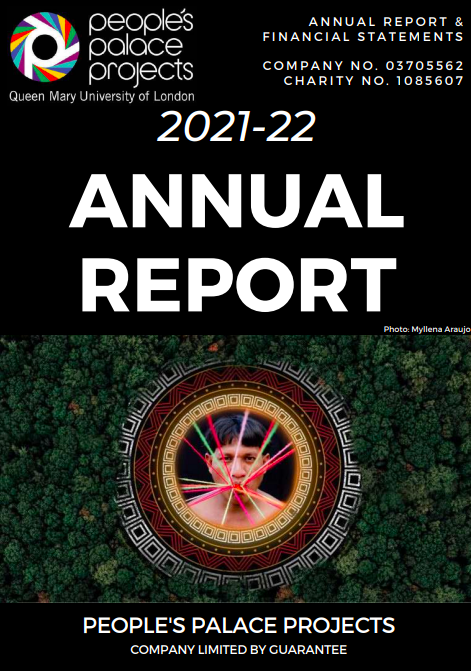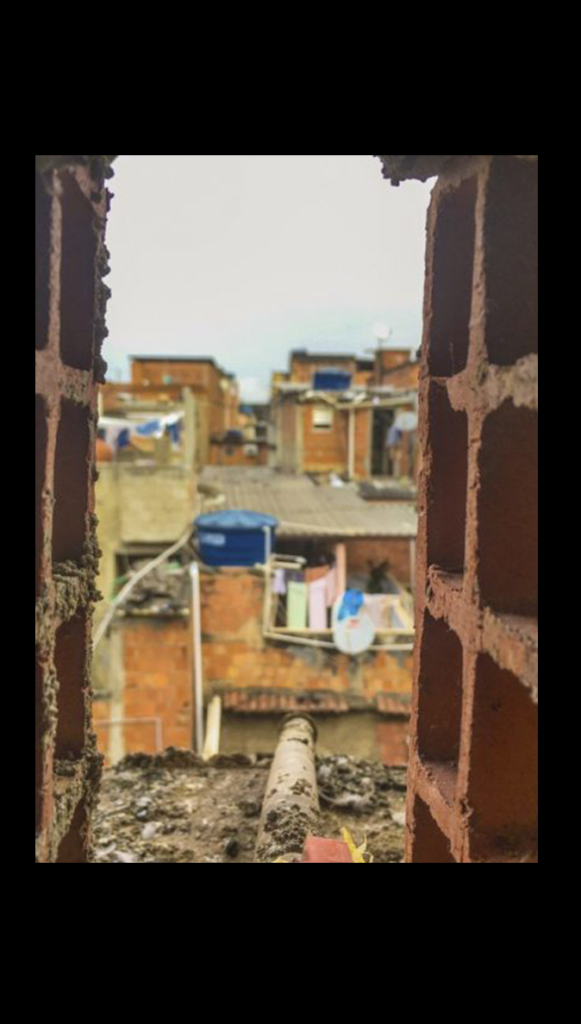
2021-2022 | Review of developments, activies & Achievements
2021-22 saw a joyful return to in-person work for PPP in which we were able to co-create art with
our partners in numerous villages, cities and countries worldwide. Our strong partnerships across
these various geographies meant that we were able to sustain efforts and pivot to online working
during the pandemic, but a return to working in person has been a great cause for celebration.
We are extraordinarily proud of our work this year with our Indigenous partners. Filmmaker
Takumã Kuikuro and singer Yamalui Kuikuro joined the largest delegation of Indigenous people in
the history of the UN Climate Change Conference (COP). We brought them to the UK with support
from QMUL to participate in a series of events, raising awareness for the protection of the Amazon
region. We connected young people in Wales with young Indigenous people of the Wauja
community, who co-created a piece of film art presented at COP26. At the same time, we curated
the first Brazilian indigenous film festival in the UK, hosted by the ICA: a week of programming so
successful the ICA repeated the programme over an additional week. In addition, our Indigenous
work was showcased at three international exhibitions: the 17th Venice Architecture Biennale, the
Glasgow Science Centre, and CPH:DOX, Copenhagen’s Documentary Film Festival.
Our work with young people with care experience returned to in-person physical theatre and
movement workshops this year, partnering with Contact Theatre, Manchester, and Battersea Arts
Centre, London.
Our role as convenor of urgent discussions around critical issues was highlighted by our position
as a research centre looking at the impact of the arts on mental health. Engaging in cultural
activities improves wellbeing and mental health, particularly for people on the margins of society.
Our research projects in this area aim to understand the impacts of this engagement, develop new
approaches, and share knowledge globally. Our work in Mare, the largest favela complex in Rio de
Janeiro, was a glorious 10-day celebration of creativity in Rio de Janeiro.
Collaboration with QMUL’s Unit for Social and Community Psychiatry took Paul Heritage, Mariana
Steffen, and Renata Peppl to India and Pakistan this year to run workshops on psychosis with our
partner organisations. The impact of this artwork on our partners’ psychiatry departments was
hugely significant. The growth and increasing importance of our work around arts and mental
health was highlighted in July 2022 by confirmation of a successful joint funding application for a
loneliness project, led by Jennifer Lau, co-director of Bart’s Youth Resilience Unit, the first UKRI
grant that we have successfully raised with the Youth Resilience Unit. The Youth Resilience Unit is
based within the Centre for Psychiatry and Mental Health at QMUL. It is funded through Bart’s
Charity and aims to investigate factors contributing towards resilience (wellbeing in the face of
adversity), and to develop and evaluate interventions that target these.

2020-2021 | Review of developments, activies & Achievements
2020-21 has been a year of unprecedented global challenges, from the immediate impacts of the COVID-19 pandemic (COVID) on the arts, vulnerable communities, healthcare provision and individual wellbeing, to the ongoing ravaging effects of climate change, to widespread instances of systemic racism, anti-immigration, xenophobia and violence.
This has resulted in an increase in active funded projects (from 17 to 29). This has, in turn, seen a significant increase in our scholarly outputs, global partnerships and networks, and impact at both local, national, and international levels. Crucial to our development this year has been a willingness to embrace the creative potential of online working both within the core PPP team and on our projects with external partners and communities. Many of our creative research projects, for example, pivoted to online workshops that provided opportunities for creative expression, problem-solving, activism, advocacy, and connection during a time of
isolation and uncertainty.
Throughout it all, People’s Palace Projects' (PPP's) activity has been at the forefront of some of the most urgent social, political, and cultural issues facing communities, artists and researchers in the UK and across the globe. Our achievements this year reflect the growth, adaptably, and integrity of PPP as an organisation, its team members, and our global partnerships.
Beyond our artistic and research-led initiatives, this year PPP has mobilised its networks and audiences to provide vital, life-saving support to the Kuikuro people of the Xingu Indigenous Territories in Brazil. In a year where many borders and opportunities have been closed, we have been proud to see our ongoing collaboration with this and other global and UK communities grow stronger than ever, demonstrating the powerful, positive interventions that our work and arts and culture more broadly can continue to make.
As part of this work, we have expanded our mission to create new ways for artists and arts organisations to produce evidence to inform local, regional, and national decision-making in relation to the creative economy, mental health, and cultural heritage’s role in preventing natural disasters.

2019-2020 | Review of developments, activies & Achievements
2020 has been a particularly challenging and transformative year for all of us. It has also brought some of the most urgent issues of our times to the forefront of our work. PPP is deeply committed to challenging systemic racial inequalities and police brutality, to addressing the urgent threat of climate change and to tackling mental health issues in young people from the peripheries that have been exacerbated by the Covid-19 pandemic.
In the next ten ears we aim to develop a network of independent research organisations within the UK’s cultural and creative sectors and worldwide that can work together testing concepts, creating models, gathering evidence,
improving practice and increasing the positive impact of the arts in people’s lives.
We believe that the breadth and accessibility of our research projects demonstrates the public benefit that our work brings to our direct beneficiaries and the wider community.

2018-2019 | Review of developments, activies & Achievements
During the year, PPP suported and enable a number of significant UK arts organisations and individual artists to have collaborative conversations and relationships with Brazilian partners. From Women of the Word Festival and White One Voice arts and homelessness moviment to Redes da Maré and AIKAX (the Association of Indigenous Kuikuro People of the Upper Xingu), the impacts and benefit of these relationships have been demonstrably and deeply significant and often long lasting.
Read full report